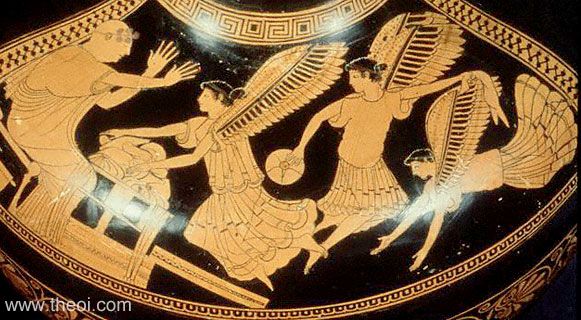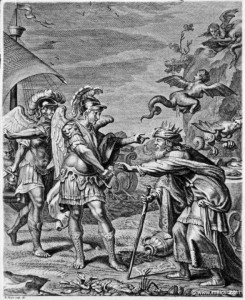Well, it’s not exactly an angel…
In Shakespeare’s The Tempest, after being shipwrecked on an island, Antonio, Sebastian, and Alonso seek food and shelter. Unbeknownst to Alonso, his two followers seek to murder him in his sleep, eager to increase their own political power. Stumbling across a banquet full of food placed by invisible spirits , the travelers sit down and begin to feast. Out of the blue, a harpy (a female monster with a human head and a bird body), crashes their treat-laden party by landing on the table and castigates the villains for their terrible deeds.
The supernatural banquet scene above alludes to the story of Phineas, a Thracean king punished for betraying a god’s trust. In the Greek myth, Zeus, king of the gods, bequests Phineas with the gift of prophecy. The untrustworthy king then uses his power to warn his allies of future dangers, including the wrath of the gods. In a fit of rage, Zeus punishes Phineas by blinding him and placing him on a desolate island with a limitless amount of sustenance. During every meal, however, harpies would swoop down and snatch the food off of Phineas’ plate, leaving behind refuse and fouled remains of his food. Their voracious behavior would leave the blind king in a perpetual state of starvation.

Harpies snatching up food from blind King Phineas. Having your meal stolen from you every time must grow tiring after a while…
Like the miserable king above, the villainous trio of nobles suffer a similar fate. Dealing with a terrifying monster (in reality the benign spirit Ariel), they quiver in their shoes as the winged woman attempts to put them in their place. Although the harpy disappears after its tirade, it still punishes the trio by exposing them as frauds and warning them that they will face judgement for their heinous deeds and intentions. A parallel to Phineas, the elderly King Alonso is blind to both the actions of his subordinates and the damage he has done Prospero, his once loyal duke. Only until an image of retribution appears in front of Alonso does he realize he has been a fool for listening to Antonio’s advice. Very self-involved, naive Alonso depends mostly on his followers’ counsel in order to accomplish things. Comparing his supernatural experience to a cathedral organ in a storm, Alonso hears “the name of Prosper; it did bass my trespass” (III.I.99) .Genuinely sorrowful for his actions against Prospero and his daughter, Alonso begs for mercy. By then, however, the harpy has dealt her supposed punishment. Just as Phineas is punished by having food snatched from him, so is King Alonso punished by having his son’s life taken away from him.
In the conclusion to Phineas’ miserable plight, Jason and his fellow Argonauts appear on the island. Hearing the old king’s plea, the Boreads, sons of the North Wind, succeed in driving off the harpies. Finally able to satisfy his eternal hunger, Phineas rewards the heroes by revealing a secret about their future trials.
While Alonso readily repents for banishing Prospero from Vienna, Antonio and Sebastian silently refuse to apologize for their devious plots. In fact, they vow to fight “one fiend at a time,” killing the “legions o’er!” (IV.I.102-103). Not even a horrifying being from Hell can terrorize them into begging for absolution. They are beyond redemption, beyond saving.
Sources:
1.Shakespeare, William. “The Tempest” The Complete Pelican Shakespeare. Eds. Stephen Orgel, and A R. Braunmuller. New York, NY: Penguin Books, 2002. Print.
2.”Harpy.” Wikipedia. Wikimedia Foundation, Web. 18 Aug. 2015.


